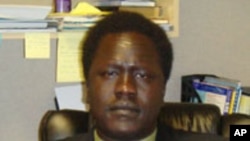The Government of Southern Sudan is coming under intense criticism after boycotting parliament one day after Washington unveiled a new Sudan strategy.
<!-- IMAGE -->The Sudan People's Liberation Movement (SPLM) claims the move is aimed at putting pressure on Khartoum's National Congress Party (NCP) to pass democratic laws needed for elections scheduled for next year.
The SPLM argues that current prevailing laws contravene the constitution, written after the 2005 peace deal, which it said allows rights abuses to continue.
But the NCP questions the boycott, saying it would not help realize the SPLM's demands.
Ezekiel Lol Gatkuoth, head of the Government of Southern Sudan Mission to the United States, said that the NCP seems not to be interested in democratic reforms.
"The reason why the SPLM walked out of parliament …is because we are actually proposing agenda that are actually meant to implement the CPA (Comprehensive Peace Agreement)…(but) the NCP is saying that we need to discuss the speech of the president of the Republic of Sudan, Omar Bashir," Gatkuoth said.
He described the NCP's discussion proposal as unfortunate.
<!-- IMAGE -->"(They said) we need to discuss the treaties or the agreements that has been signed by the ministries…for example if the ministry of energy and mining had an agreement with another ministry of energy and mining of another country," he said.
Gatkuoth denied the SPLM will continue with the parliamentary boycott.
"We are not saying that we are going to continue to boycott this for one week. We are saying let us move on, discussing issues that are relevant… even if today they (NCP) had agreed that these are the things that we will discuss. Then we will go back to the parliament," Gatkuoth said.
The NCP questioned the rationale behind parliamentary boycott, saying it undermines its determination to have an agreement on the SPLM's proposed discussions.
Gatkuoth said SPLM is uncomfortable about new security laws.
"We are having concern(s) about the security law because they (NCP) want the security agency to have the power of arresting people confiscating properties of anybody or any party, and even seizures and searches…It is not in conformity with the CPA and the constitution of Sudan," Gatkuoth said.
On Monday, President Barack Obama's administration unveiled a new policy of engagement toward Sudan, offering incentives to embattled President Bashir's government to implement the 2005 CPA and end a separate conflict in Darfur. But it warned of penalties if Bashir's NCP drags its feet.
<!-- IMAGE -->Khartoum criticized the new U.S. policy, but simultaneously said that it embodies ideas indicating a change in U.S. policy.
Gatkuoth says his south Sudanese government welcomes Washington's new policy.
"The SPLM and the Government of Southern Sudan is very happy with the U.S policy towards Sudan (because) number one, in the first time in the history of the U.S administration, the Obama administration came out openly that there is a possibility of two states co-existing side by side in peace in 2011," Gatkuoth said.
He said the new U.S policy backs the SPLM stance about possible autonomy for southern Sudan after next year's election.
Washington also warned Khartoum that the country could be plunged into chaos if it fails fully to implement the CPA.
<!-- IMAGE -->













